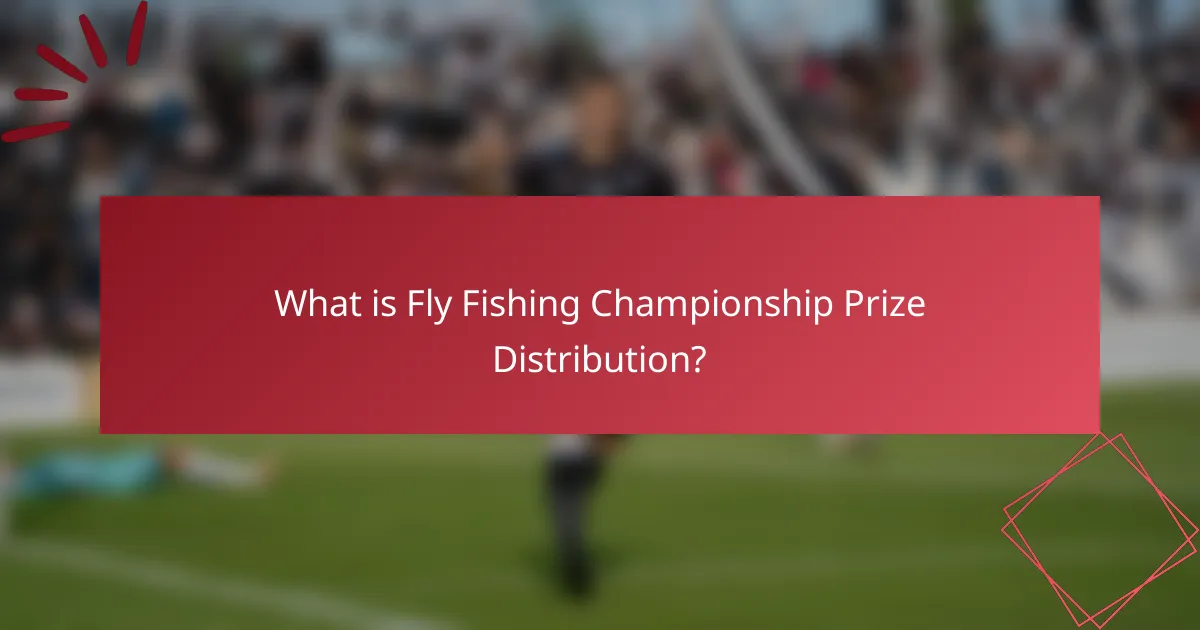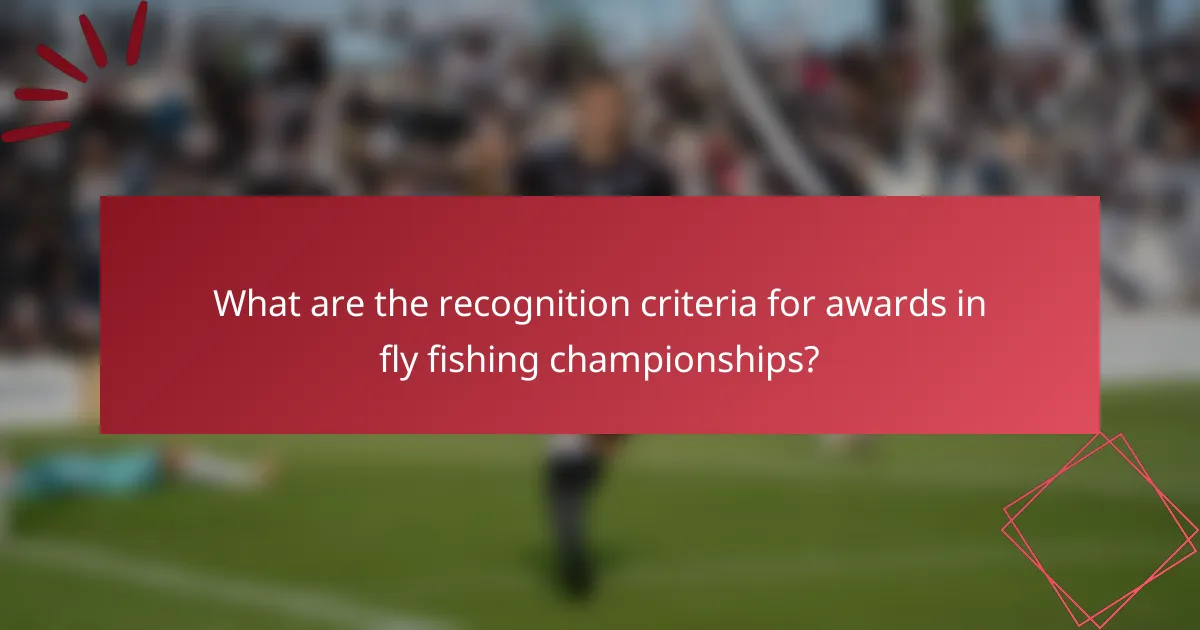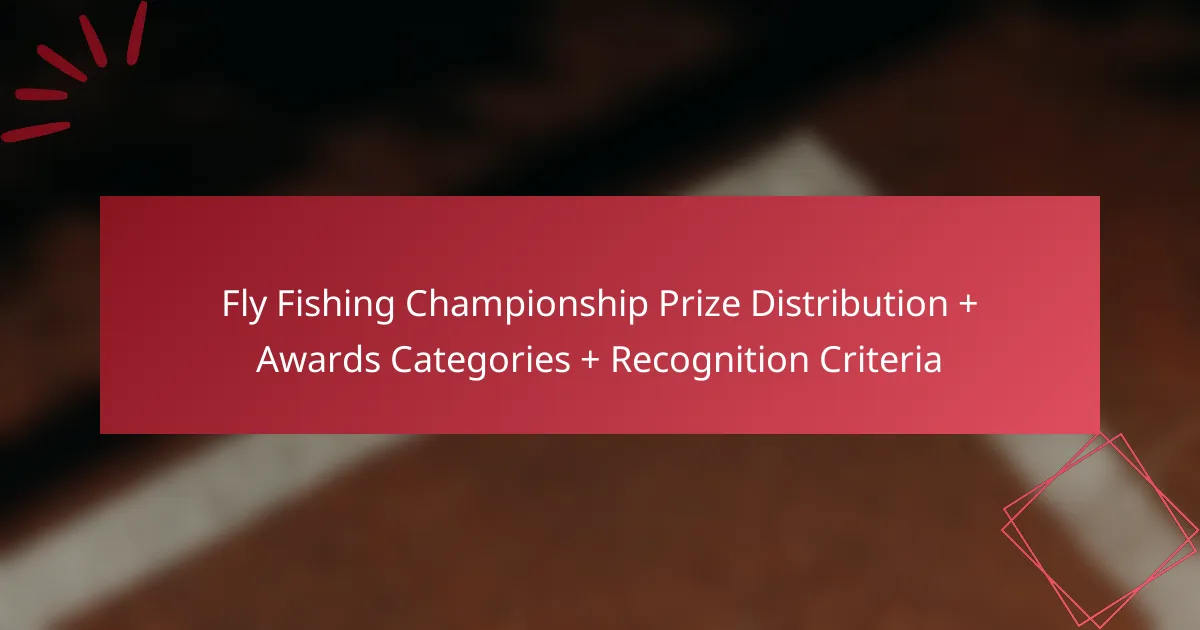Fly Fishing Championship Prize Distribution encompasses the allocation of awards and prizes to participants in fly fishing competitions, recognizing achievements based on performance metrics such as the largest fish caught, the most fish landed, and best technique. Prizes may include monetary awards, trophies, and sponsorship deals, with structures varying by event. Key award categories include Best Overall Angler, Largest Fish, and Most Fish Caught, among others, each evaluated by specific criteria like weight and number of fish. Recognition is also influenced by factors such as adherence to competition rules and sustainable practices. This framework not only incentivizes participation but also highlights skill and excellence within the sport of fly fishing.

What is Fly Fishing Championship Prize Distribution?
Fly Fishing Championship Prize Distribution refers to the allocation of awards and prizes for participants in fly fishing competitions. Typically, prizes are awarded based on performance, including categories such as largest fish caught, most fish caught, or best technique. The distribution often includes monetary prizes, trophies, and sponsorship deals. Events may vary in their prize structures, with some offering cash awards while others provide gear or fishing equipment. Historical data shows that top competitors can earn significant prizes, sometimes exceeding thousands of dollars. This structure encourages participation and recognizes skill in the sport.
How are prizes awarded in fly fishing championships?
Prizes in fly fishing championships are awarded based on the performance of participants in various categories. Competitors are typically judged on the number and size of fish caught within a specified time frame. Points may be allocated for each fish, with larger species earning more points.
In some tournaments, categories may include best catch, largest fish, or most fish caught. Awards can vary from trophies to cash prizes, depending on the championship’s rules. The distribution of prizes is often announced during an awards ceremony at the event’s conclusion.
Many championships follow standardized scoring systems to ensure fairness and transparency. These systems are designed to recognize skill and adherence to competition rules.
What types of prizes are typically distributed?
Typical prizes distributed in fly fishing championships include trophies, cash awards, and fishing gear. Trophies recognize top performers in various categories. Cash awards provide financial incentives for winners and can vary by competition level. Fishing gear prizes often consist of rods, reels, and accessories, enhancing participants’ future fishing experiences. Additionally, some events may offer gift certificates for outdoor retailers. These prizes encourage participation and reward skill and dedication in the sport.
Who determines the prize distribution criteria?
The organizing committee determines the prize distribution criteria for fly fishing championships. This committee is typically composed of experienced anglers and event officials. They establish guidelines based on participation levels and sponsorship contributions. Historical performance and skill levels may also influence the criteria. The criteria aim to ensure fairness and encourage competition among participants. Additionally, these guidelines are often published prior to the event for transparency. This process helps maintain the integrity of the championship.
Why is prize distribution important in fly fishing competitions?
Prize distribution is important in fly fishing competitions because it incentivizes participation and recognizes skill. Competitors are motivated to perform their best when there are tangible rewards. Prizes can include trophies, monetary awards, or gear, which enhance the competitive experience. A well-structured prize distribution fosters a sense of achievement among participants. It also promotes fair competition by acknowledging various skill levels through different award categories. Recognizing achievements can help build community within the sport. Moreover, effective prize distribution can attract sponsors, contributing to the growth of the competition. Overall, it plays a crucial role in maintaining interest and enthusiasm in fly fishing events.
How does prize distribution impact participant motivation?
Prize distribution significantly impacts participant motivation by influencing their engagement and performance levels. When prizes are perceived as valuable and attainable, participants are more likely to be motivated to compete. Research shows that clear and structured prize distribution can enhance competitive spirit. For example, a study published in the Journal of Sports Economics indicates that participants are driven by both intrinsic and extrinsic rewards. The presence of substantial prizes can lead to increased effort and commitment during competitions. Moreover, equitable prize distribution fosters a sense of fairness, further motivating participants to perform at their best.
What role does prize distribution play in promoting the sport?
Prize distribution plays a crucial role in promoting the sport of fly fishing. It incentivizes participants to engage and compete at higher levels. By offering attractive prizes, organizers can attract more competitors and spectators. Increased participation leads to greater visibility for the sport. Additionally, prize distribution enhances the prestige of competitions. High-value awards can elevate the reputation of events. This, in turn, encourages sponsorship and investment in the sport. Overall, effective prize distribution fosters growth and interest in fly fishing.

What are the different awards categories in fly fishing championships?
The different awards categories in fly fishing championships typically include Best Overall Angler, Largest Fish, and Most Fish Caught. Additional categories may consist of Best Technique, Best Fly Pattern, and Best Team Performance. These categories recognize individual and team achievements during competitions. Awards are often based on specific criteria such as weight, length, and number of fish caught. For instance, the Largest Fish category awards the angler who catches the heaviest fish. The Most Fish Caught category honors the angler with the highest total number of fish landed. Each championship may have unique categories tailored to its specific rules and objectives.
What are the common awards categories in fly fishing competitions?
Common awards categories in fly fishing competitions include Best Catch, Largest Fish, and Most Fish Caught. Other categories may feature Best Technique, Best Fly Pattern, and Best Overall Angler. These categories recognize different skills and achievements among participants. Awards often vary by competition, but these categories are frequently seen. They help highlight individual strengths in the sport.
How are categories differentiated based on skill levels?
Categories are differentiated based on skill levels by classifying participants into novice, intermediate, and expert groups. Novice categories typically include beginners who have minimal experience. Intermediate categories are for those with some experience and skill refinement. Expert categories consist of highly skilled individuals with advanced techniques and extensive knowledge. This classification allows for fair competition among participants at similar skill levels. It ensures that awards are distributed equitably based on performance and ability.
What unique awards might be included in specific championships?
Unique awards in fly fishing championships may include categories such as Best Catch, Largest Fish, and Most Unique Fly. These awards recognize specific achievements within the competition. Best Catch typically honors the angler with the most impressive overall catch. Largest Fish awards are given for the heaviest fish landed during the event. Most Unique Fly recognizes creativity in fly design. These awards enhance competition and motivate participants to excel. Specific championships may tailor awards to their unique rules and objectives. For example, some may include awards for youth participants or conservation efforts. Such unique awards contribute to the overall experience and prestige of the championship.
How do awards categories enhance the competitive experience?
Awards categories enhance the competitive experience by providing clear benchmarks for achievement. They motivate participants to excel by recognizing specific skills and accomplishments. For example, categories can include best technique, largest catch, or most innovative approach. This segmentation allows competitors to focus on their strengths. It also fosters a sense of fairness by ensuring all participants have an equal opportunity for recognition. Additionally, awards categories can increase engagement and excitement among competitors and spectators alike. Research indicates that structured recognition systems improve overall satisfaction in competitive environments.
What benefits do participants gain from diverse award categories?
Participants gain recognition and motivation from diverse award categories. This variety caters to different skills and achievements. It encourages broader participation by appealing to a wider audience. Specific awards can highlight unique talents, fostering a sense of accomplishment. Diverse categories also promote healthy competition among participants. They create opportunities for recognition beyond just overall winners. This inclusivity can enhance community engagement and support. Overall, diverse award categories enrich the experience for all involved.
How do awards categories influence participant engagement?
Awards categories significantly influence participant engagement by providing clear goals and recognition opportunities. When participants understand the specific categories, they can tailor their efforts to excel in those areas. This targeted focus increases motivation and enhances competitive spirit. For example, categories that recognize skill diversity, such as largest catch or best technique, encourage broader participation. Additionally, well-defined categories can attract more entrants by appealing to various skill levels and interests. Research shows that events with diverse award categories see higher participation rates, as they cater to a wider audience. Ultimately, effective awards categories foster a sense of community and excitement among participants, leading to increased engagement.

What are the recognition criteria for awards in fly fishing championships?
Recognition criteria for awards in fly fishing championships typically include factors such as the total weight of fish caught, the number of fish caught, and adherence to competition rules. Competitors are often judged on their skill in casting, the choice of flies, and overall technique. Points may be awarded based on the size of the fish, with larger specimens earning more points. Additionally, the use of sustainable practices and catch-and-release methods can influence recognition. Specific championships may have unique criteria outlined in their rules, which competitors must follow to qualify for awards. These criteria ensure fairness and promote excellence in the sport.
What factors are considered in determining recognition criteria?
Recognition criteria are determined by several key factors. These factors include performance metrics, such as the number of fish caught and their sizes. Participation levels also play a significant role in recognition criteria. The skill level demonstrated by participants during the competition is critically assessed. Adherence to competition rules and regulations is essential for recognition. The overall contribution to the sport, including sportsmanship and community engagement, is considered. Historical performance in previous championships can influence recognition outcomes. Finally, feedback from judges and peers may impact the final recognition decisions.
How do performance metrics influence recognition?
Performance metrics significantly influence recognition in competitive contexts. They provide quantifiable data that reflects a participant’s skill and achievement. In fly fishing championships, metrics such as the number of fish caught, size, and time taken are critical. These metrics allow judges and organizers to objectively assess performance. Higher metrics typically lead to greater recognition and awards. For instance, a competitor with the highest number of points will likely receive top honors. This system encourages participants to improve their skills and compete more effectively. Thus, performance metrics serve as a foundation for fair and transparent recognition in competitions.
What role do sportsmanship and ethics play in recognition criteria?
Sportsmanship and ethics are crucial in recognition criteria for competitions. They ensure fair play and respect among participants. Recognition criteria often include assessments of behavior and integrity. Awards may be given for exemplary conduct beyond performance metrics. This promotes a positive environment in competitive settings. Ethical behavior reinforces the values of the sport. Organizations may implement codes of conduct to guide participants. Violations can lead to disqualification or loss of awards. Ultimately, sportsmanship and ethics enhance the credibility of the championship.
How can participants meet the recognition criteria effectively?
Participants can meet the recognition criteria effectively by adhering to the established guidelines and demonstrating skill. They should familiarize themselves with the specific criteria set forth by the championship. This includes understanding the required performance metrics and any documentation needed for submission. Regular practice and participation in qualifying events enhance their skills and visibility. Additionally, networking with experienced anglers can provide insights into best practices. Consistent performance in competitions also builds a strong case for recognition. Engaging in community events can further showcase their commitment to the sport. Ultimately, meeting these criteria requires dedication and a strategic approach to competition.
What strategies can enhance chances of receiving awards?
To enhance chances of receiving awards in fly fishing championships, participants should focus on several key strategies. First, mastering essential fly fishing techniques is crucial. Competitors should practice casting, presentation, and knot tying regularly. Second, understanding the specific rules and criteria for each award category is important. Familiarity with the judging process can guide preparation. Third, selecting the right equipment can significantly impact performance. Quality rods, reels, and flies tailored to the competition’s environment can lead to better results. Fourth, participating in local tournaments can build experience and confidence. Engaging with the community can provide valuable insights and tips. Lastly, maintaining a positive attitude and resilience during competitions can influence judges’ perceptions. These strategies collectively increase the likelihood of recognition and awards in fly fishing events.
How important is preparation and practice in achieving recognition?
Preparation and practice are crucial for achieving recognition in competitive environments like fly fishing championships. Consistent practice enhances skill levels and boosts confidence. Preparation involves studying techniques, understanding regulations, and knowing the competition. According to a study by the Journal of Sports Sciences, athletes who engage in structured practice show a 20% improvement in performance metrics. This improvement directly correlates with recognition in competitions. Recognition often follows demonstrated skill and consistent performance. Therefore, thorough preparation and dedicated practice significantly influence the likelihood of receiving awards and accolades.
What tips can help participants excel in fly fishing championships?
To excel in fly fishing championships, participants should focus on mastering casting techniques. Precise casting allows for better presentation of the fly. Understanding the local water conditions is crucial for success. Participants should study the behavior of fish in those specific environments. Selecting the right gear, including rods and reels, enhances performance. Knowledge of fly types and their effectiveness in various conditions is essential. Practicing regularly improves muscle memory and technique. Participants should also engage with experienced anglers to gain insights and tips.
Fly Fishing Championship Prize Distribution encompasses the allocation of awards and prizes in fly fishing competitions, focusing on performance metrics such as the size and number of fish caught. The article details various prize types, including monetary awards, trophies, and fishing gear, and explains the criteria used for their distribution, determined by an organizing committee. It also highlights the importance of prize distribution in motivating participants, promoting fair competition, and enhancing the sport’s visibility. Additionally, the article outlines different awards categories and recognition criteria, emphasizing how they influence participant engagement and the competitive experience.
